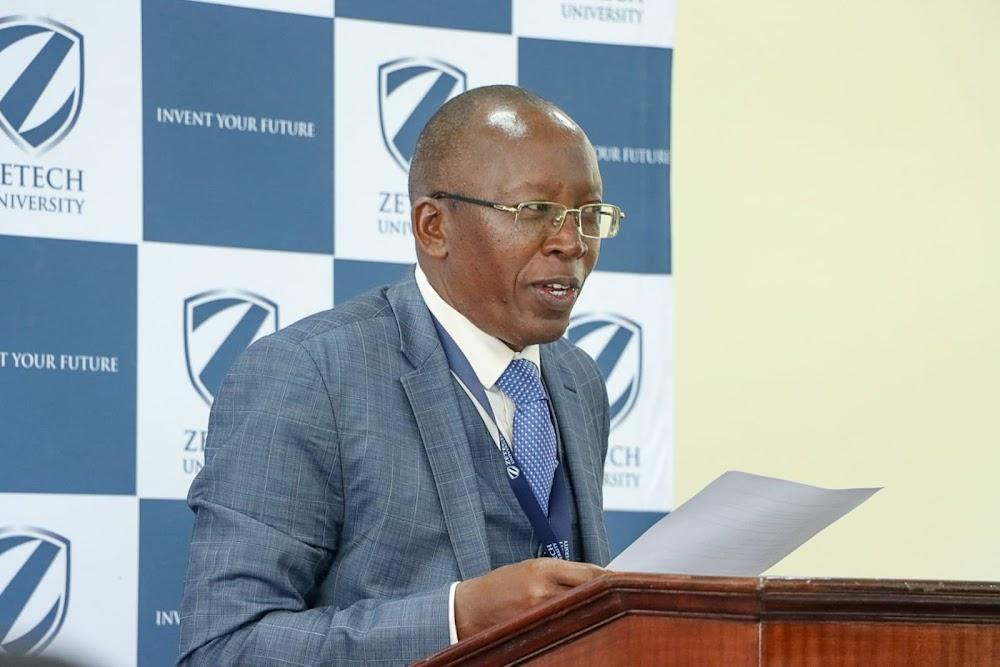Africa-Press – Kenya. As the government accelerates the rolling out of digital ICT hubs in all 290 constituencies across the country, institutions of higher learning are also seeking to be allowed to host such technological labs to complement efforts to build a digitally empowered nation.
Zetech University is the latest institution seeking to be allowed to empower Kiambu County youths technologically by training them at their state-of-the-art technological labs.
According to the university Vice Chancellor Professor Njenga Munene, the institution seeks to partner with the local government to train and equip youngsters with technological skills to facilitate their employment.
Munene noted that millions of educated youths only require extra digital skills to begin earning from the numerous local and global employers ready to tap the talented workforce.
“We seek to complement the government’s program which is part of the digital transformation agenda that aims at providing digital skills, e-services, and online opportunities to young people across the country,” Prof Munene said.
He made the statement at a time when the country continues to position itself at the forefront of Africa’s Business Process Outsourcing sector (BPO) by rolling out digital hubs.
The VC noted that some of the training students and youths will receive through the programme include Transcription, Digital Marketing, Virtual Assistance, Data entry and management and Online Writing among others.
“The programme will enhance the training of our youth on the importance of leveraging skills such as article writing, transcription, digital marketing and virtual assistance in transforming their livelihoods by working online. Most of our students are earning while learning,” he said.
He at the same time revealed that the University has invested heavily in Information and Technology programmes to supplement and fix the skill gaps in the job market, especially through its incubation hub that seeks to exploit innovation and technology as an enabler for job creation.
Prof Munene said that the world has embraced technology and organizations are in constant demand of a tech-savvy workforce that adds value to the market.
“Shortage of critical tech skills in the region is constraining local businesses and slowing economic growth. Individuals and companies must keep up with the technological disruptions, trends, problems, and opportunities to make better and sustainable career, commercial, and institutional decisions,” Munene said.
He noted that the digital era continues to rapidly evolve; citing the emergence of Digital Governments, Digital Economies, Digital Currencies and Digital Societies.
“All these must leverage technology to effect transformation and impact health, transport, urban living, government services, climate change, environmental conservation, access to education and economic opportunities, among other societal needs,” he said.
Kiambu Deputy Governor Rosemary Kirika who spoke at the institution challenged the university to also digitally empower businesspersons to upscale their operations.
Construction of hubs is included in Kenya’s Digital Masterplan 2022-2032, which governs the systematic delivery of ICT infrastructure, services, and skill development.
It also provides the country with a 10-year strategy for ICT projects to help investors determine their priorities.
It lists 19 key initiatives on which the government will focus to advance the country’s digital transformation
So far, tens of Jitume Hubs have been opened, an initiative that Members of Parliament continue to fast-track to enhance digital literacy among the youth.
The government seeks to have ICT hubs in all the 1450 wards in the country with Digital Superhighway being one of the key pillars of the Kenya Kwanza administration development plan as championed in the Bottom-Up Economic Transformation Agenda (BETA).
President William Ruto’s government seeks to scale up its investments in the relevant infrastructure, including the national broadband and digital hubs, to create jobs for at least one million digital workers in the next five years.
For More News And Analysis About Kenya Follow Africa-Press






